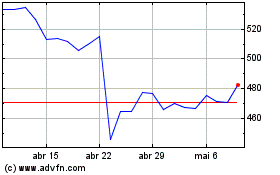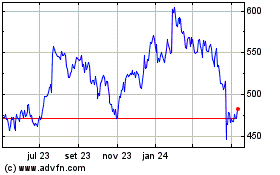Saudi Arabia's Stock Exchange Boosted Ahead of Aramco IPO
20 Junho 2018 - 8:02PM
Dow Jones News
By Nicolas Parasie
Saudi Arabia's economy is set to draw tens of billions of
dollars in foreign investment after gaining recognition Wednesday
as an emerging market from index compiler MSCI Inc., a vote of
confidence for the domestic stock exchange ahead of the Aramco
IPO.
Saudi Arabia will be added to MSCI's emerging market index next
year in two stages, joining a group of countries including Russia
and China. Many of the world's largest fund managers benchmark
themselves against index compilers and will automatically invest in
Saudi stocks following the upgrade. With a market capitalization of
around $520 billion, the Tadawul, as the bourse is locally named,
is the Arab world's largest stock market.
MSCI said Riyadh would have a weight of 2.6% in the emerging
market index. That could eventually rise if Saudi Arabia goes ahead
with the initial public offering of state-owned energy Saudi
Arabian Oil Co. on the local exchange. If it goes forward, the IPO
of Aramco, as the company is known, is expected to be the most
valuable ever.
Ehsan Khoman, head of research for the Middle East at Bank of
Tokyo-Mitsubishi, estimates that up to $40 billion of fresh foreign
inflows would be channeled into Saudi Arabia's stock market in the
next year.
"People will realize Saudi Arabia is becoming a more
sophisticated financial player, this will open doors to other parts
of the economy," Mr. Khoman said.
The road toward the MSCI upgrade began in 2015 when Saudi Arabia
for the first time opened its stock market to direct foreign
investments. The Tadawul and its regulators have developed a rapid
series of changes designed to bring its technology in line with
international standards and to court more overseas investors.
While the MSCI designation isn't related to the Aramco IPO
expected later this year or next, it represented a stamp of
approval for those changes.
In March, rival index compiler FTSE Russell said it would also
classify Saudi Arabia as an emerging market.
The Saudi stock market closed flat on Wednesday ahead of the
MSCI decision, after having risen 16% since the start of the
year.
The inclusion of the kingdom comes as efforts to transform Saudi
Arabia's oil-dependent economy have had mixed success. Foreign
direct investment fell to a 14-year low of $1.4 billion in 2017
from an average $18.2 billion in the years 2005 to 2007, recent
United Nations numbers show, while unemployment remains high.
Foreign interest in Saudi stocks also remained underwhelming, at
about 5%, despite the changes that were introduced.
Saudi Arabia, as its oil-exporting neighbors in the Persian
Gulf, in recent years was forced to introduce some drastic and
often painful reforms, such as reducing energy subsidies, to manage
the impact of the sharp drop in oil revenues. The country's goal is
to make the economy less reliant on the state's oil largess by
promoting the private sector and to create sufficient jobs for a
fast-growing population.
The reforms, which go hand in hand with cultural and domestic
changes such as allowing women to drive, are overseen by the
country's crown prince Mohammed bin Salman. Some of his actions,
most notably the arrest of dozens of businessmen and officials in
November in what the government said was an anticorruption drive,
have raised concerns among foreign investors.
Write to Nicolas Parasie at nicolas.parasie@wsj.com
(END) Dow Jones Newswires
June 20, 2018 18:47 ET (22:47 GMT)
Copyright (c) 2018 Dow Jones & Company, Inc.
MSCI (NYSE:MSCI)
Gráfico Histórico do Ativo
De Set 2024 até Out 2024

MSCI (NYSE:MSCI)
Gráfico Histórico do Ativo
De Out 2023 até Out 2024
